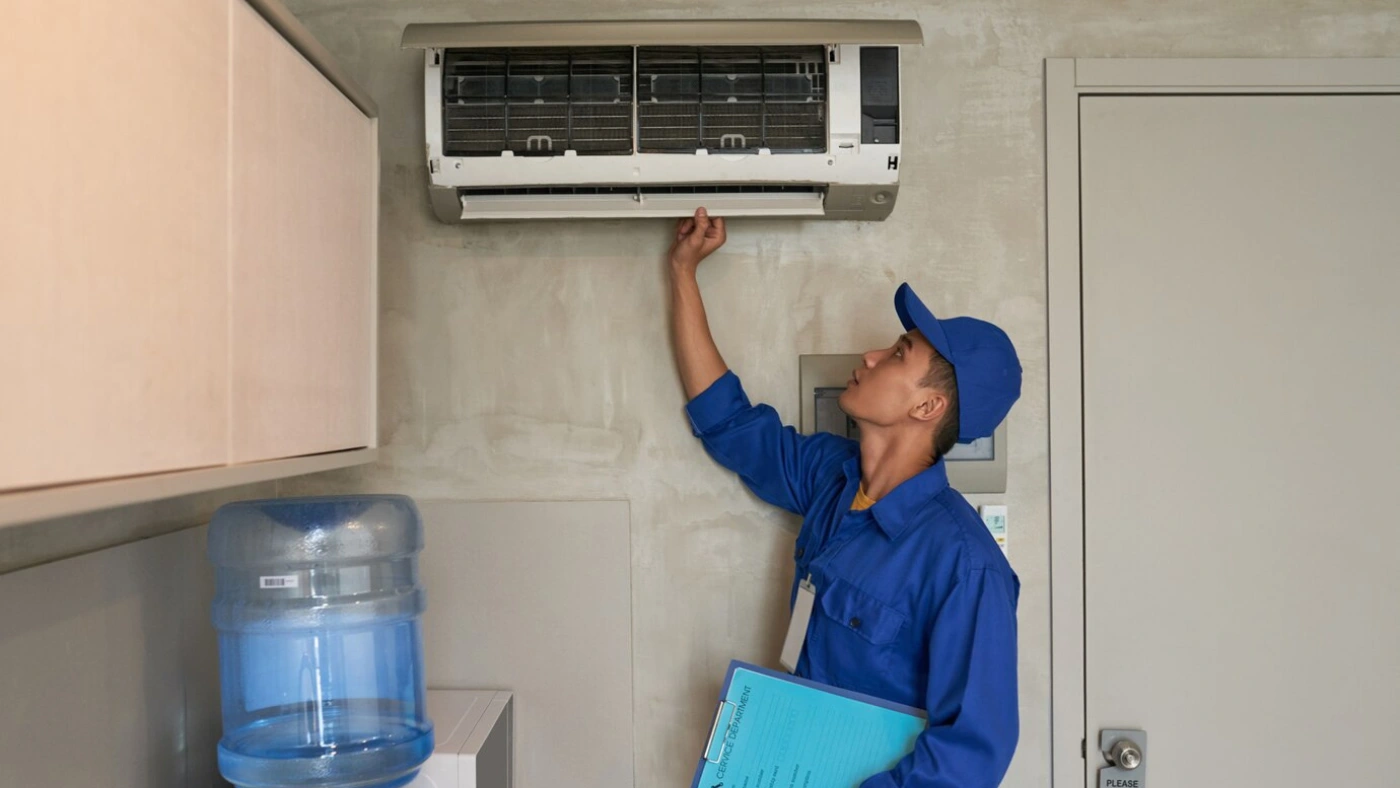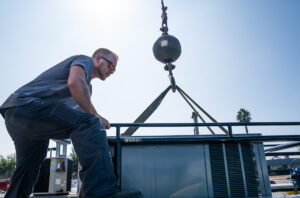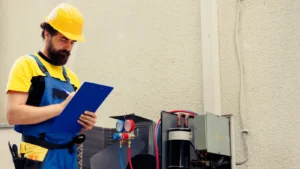
Want to see your potential revenue?
See what businesses like yours earn with Housecall Pro in 1 - 2 minutes.

Every HVAC business owner knows the frustration: technicians scrambling between appointments, customers wondering when—or even if—their technician will show, and valuable time slipping away. All that to say: inefficient dispatching could cost your HVAC business thousands of dollars every year.
Fortunately, transforming that chaos into streamlined efficiency isn’t just possible; it’s simpler than you think. And it all starts with effective dispatching.
So, how do you improve your HVAC dispatching game? Here are seven HVAC dispatching tips designed to simplify your scheduling, maximize your team’s productivity, delight your customers, and enhance your bottom line.
Run a More Efficient Team with These HVAC Dispatching Tips
- What Does an HVAC Dispatcher Do?
- Skills Every HVAC Dispatcher Needs to Succeed
- 5 Common HVAC Dispatching Mistakes That Are Costing You Money
- 7 HVAC Dispatching Tips to Maximize Efficiency & Profits
- 1. Use Software to Automate Scheduling & Dispatching
- 2. Prioritize Jobs Based on Urgency and Complexity
- 3. Optimize Routes to Reduce Drive Time and Fuel Costs
- 4. Keep Customers Informed with Automated Updates
- 5. Train Dispatchers to Think Like a Business Owner
- 6. Have a Backup Plan for Cancellations and No-Shows
- 7. Use Data to Improve Your Dispatching Success
- Training Your HVAC Dispatcher for Peak Performance
- Housecall Pro Makes Dispatching HVAC Teams Simple
- One Simple Change That Will Transform Your Dispatching
What Does an HVAC Dispatcher Do?
Your HVAC dispatcher acts as the nerve center of your business, responsible for keeping day-to-day operations running smoothly. They balance urgent calls, routine maintenance schedules, and unexpected breakdowns without creating confusion.
They give your field techs detailed job information covering equipment needs and customer satisfaction, setting them up for a successful call. They also maintain clear communication with customers, keeping them in the loop about service times and status updates.
Their role is integral to reducing downtime, optimizing technician productivity, and improving customer satisfaction by ensuring smooth operations. For example, during peak season, your dispatcher will carefully prioritize tasks to handle urgent cooling or heating emergencies promptly while simultaneously managing routine maintenance calls.
Skills Every HVAC Dispatcher Needs to Succeed
To be successful in their craft, HVAC dispatchers need several core skills:
- Predictive Planning: Anticipating scheduling conflicts and proactively addressing them to avoid expensive (and inconvenient) delays.
- Multitasking: Managing multiple tasks simultaneously, including techs, customers, and last-minute scheduling changes, with precision.
- Strong HVAC Knowledge: Understanding different job types to match the right technician to the task and reduce callbacks.
- Exceptional Communication: Clearly communicating with technicians and customers without overwhelming anyone to build trust and reliability.
- Digital Proficiency: Using HVAC dispatch software effectively to streamline operations and improve accuracy.
A dispatcher with each of these skills in their toolbox can majorly impact your business’s overall profitability and customer retention.
5 Common HVAC Dispatching Mistakes That Are Costing You Money
Mistakes cost your business time and money. But before you can correct them, you need to identify what they are. Common pitfalls your HVAC dispatchers might be making include:
- Overbooking Technicians: Your techs need adequate time to get their jobs done. If you’re overbooking them, there’s a good chance technician burnout, rushed jobs, and customer dissatisfaction will become problems.
- Incorrect Technician Assignment: It’s important your techs have what they need to get the job done. If they arrive at a job unprepared for the task at hand, you’ll deal with wasted time and the headache of additional rescheduling that could’ve been otherwise avoided.
- Ignoring Drive Times: The time it takes to get to and from a job matters. Without proper route planning, you’re probably losing out on billable hours and racking up unnecessary fuel costs.
- Using Pen and Paper: Mistakes happen, especially when you’re using manual HVAC scheduling and dispatching techniques. It can be far too easy to mess up a critical detail, which can open the door to delays, inaccuracies, and poor communication, none of which reflect well on your business.
- Neglecting Customer Communication: Good communication is a must, both with your team and your customers. If you don’t provide timely updates and leave customers in the dark, you’re bound to encounter customer frustration and cancellations.
7 HVAC Dispatching Tips to Maximize Efficiency & Profits
Ironing out the issues in your current dispatching setup can feel overwhelming, especially if you’ve identified a whole laundry list of problems, but it doesn’t have to be. Here are seven HVAC dispatching tips to help you boost your bottom line and improve overall efficiency:
1. Use Software to Automate Scheduling & Dispatching
There are tools out there that can make dispatching far easier, so why not use them and ease the burden on your team? Dispatch software for HVAC, like Housecall Pro, automates assignments based on technician availability, skill set, and location. Real-time scheduling helps adapt to emergencies or cancellations without a hitch. Integrated GPS tracking allows dispatchers to pinpoint each technician’s location instantly, making it easier to make smart scheduling adjustments.
Pairing automated dispatch software with advanced features like Housecall Pro’s voice solutions allows your dispatchers and technicians to update job statuses and manage schedules effortlessly, even on the go.
Each aspect of HVAC scheduling software is specifically designed to simplify the dispatch process. It dramatically reduces the risk of human error by passing off mundane tasks to automation, freeing time for your team to focus on what matters most: serving your customers.
Pro Tip: Housecall Pro helps automate dispatching, so your team can handle more jobs with fewer headaches.
2. Prioritize Jobs Based on Urgency and Complexity
Whether you use automated scheduling software or not, it’s important to establish clear priority levels for tasks, from emergency repairs to routine maintenance and installations. Complex tasks should go to the most experienced HVAC techs to improve first-time fix rates.
Emergency repairs should take priority, but ideally not at the expense of another customer’s service. Including buffer times in your schedules to handle urgent calls can ensure you have the time to serve emergent needs without disrupting other appointments.
Looking at your schedule from an urgency and complexity standpoint helps technicians focus their energy on critical tasks first, ensuring higher customer satisfaction.
3. Optimize Routes to Reduce Drive Time and Fuel Costs
Time is money. So, use route optimization tools to group jobs geographically and reduce unnecessary travel. Avoid backtracking by sequencing jobs logically and adjusting based on real-time traffic updates.
While a few minutes here and there might seem insignificant, they add up in wasted time and fuel expenses. When you use route optimization tools, you can not only improve technician productivity and customer satisfaction but also save on fuel expenses.
Pro Tip: Housecall Pro’s GPS tracking feature optimizes routes, reducing fuel costs and drive times significantly.
4. Keep Customers Informed with Automated Updates
As a customer, it’s nice to know exactly when your service technician is arriving—especially when you’re juggling an already packed schedule. Providing automatic text and email reminders alongside real-time technician tracking not only gives your customers peace of mind but can also help dramatically reduce missed appointments.
When you keep your customers in the loop and follow up after service, you reinforce a positive experience, building loyalty and encouraging repeat business. And that’s a win for your company.
Pro Tip: Housecall Pro’s automated notifications keep your customers informed, all without any extra effort on your part.
5. Train Dispatchers to Think Like a Business Owner
The most effective HVAC dispatchers think on their toes, much like a business owner. They’re always thinking strategically, identifying ways to maximize profitability and efficiency. Of course, getting to this point takes some training.
When you onboard your HVAC service dispatchers, train them to think like you, the business owner. Training should focus on optimal scheduling, customer communication, and leveraging dispatch software to make informed decisions. This way, you’re all on the same page and can make split-second calls that, ultimately, boost your company’s productivity and bottom line.
Pro Tip: Use Housecall Pro’s HVAC dispatcher script template to standardize communication and training.
6. Have a Backup Plan for Cancellations and No-Shows
Sometimes, despite your dispatchers’ best efforts, cancellations and no-shows will happen. If you have a backup strategy in place for these inevitable situations, you can keep productivity at a consistent level.
That backup strategy may look different from one company to the next, but it should include a customer waiting list. Call those customers when you have last-minute vacancies—if you’re lucky, you’ll have one or two customers who are available and will happily take those empty slots.
Additionally, use technician availability alerts to reassign jobs rapidly, offering incentives for same-day rescheduling rather than cancellations. Each of these strategies builds a robust backup plan that, in the event of unexpected cancellations and no-shows, can help reduce downtime, maximize technician productivity, and keep your revenue flowing.
7. Use Data to Improve Your Dispatching Success
Few things are perfect on the first go, and the same will likely be true for your HVAC dispatching strategy. It might take some trial and error to find your rhythm and identify what works best for your business.
In this stage, it’s not a bad idea to use HVAC field service dispatching software with built-in analytics to evaluate dispatch efficiency and pinpoint areas for improvement. Track metrics such as first-time fix rates, response times, and completion rates. Take a closer look at patterns and continually refine your scheduling processes.
Don’t forget about your customers’ input! Ask them what they think, specifically about the dispatch service they received. Incorporate the feedback you get from them to continuously improve weak points.
Using data-driven strategies can improve service efficiency by identifying trends and pinpointing issues, thus giving you the information you need to adjust processes accordingly. It may take time, but after a while, you’ll iron out the kinks and find your groove.
Training Your HVAC Dispatcher for Peak Performance
If you want your HVAC dispatchers to work at their best, you need to train them to work at what you consider peak performance. This includes:
- Investing in HVAC dispatcher training: The better your dispatchers understand the industry, the better they can think on their toes, and the smoother things will run.
- Create a dispatcher manual: Make it easy to address various common issues by creating a playbook. Standardize processes in an HVAC dispatcher training manual to ensure everyone is on the same page.
- Giving them the right tools: Your dispatchers will need the right tools to work efficiently. This includes dispatching software, GPS tracking, voice solutions, and communication platforms, all of which can make their job easier.
- Encouraging ongoing learning: There’s always something new to learn. So, give your dispatchers a helping hand by offering regular coaching sessions that keep them up-to-date on best practices and new processes.
Get In Touch: 858-842-5746
Let us earn your trust
On average, Pros increase monthly revenue generated through Housecall Pro by more than 35% after their first year.
See plan options and feature breakdown on our pricing page.
Housecall Pro Makes Dispatching HVAC Teams Simple
With Housecall Pro, you can create a dream team of HVAC dispatchers that combines the best of automated efficiency with human intelligence. It offers:
- Automated scheduling and real-time updates to reduce back-and-forth calls and manual work
- GPS tracking and smart routing to cut drive time and fuel costs
- Seamless integration with invoicing and payments so you can get paid faster without extra administrative work
- Mobile-friendly capabilities for techs in the field, meaning no more paperwork or missing job details
This software for HVAC contractors is designed to make your (and your HVAC dispatchers) job much easier, one automated feature at a time.
One Simple Change That Will Transform Your Dispatching
With the right strategies and tactics, you can train your HVAC dispatchers to be absolute superstars who excel in their field. While hiring a talented dispatcher is a must-do to ensure that your training is effective, using strong HVAC dispatch software can make all the difference.
Tools like Housecall Pro streamline the mundane, repetitive parts of dispatching that often fall prey to human error. With it, you get automated scheduling, route optimization, and more, all designed to help you maintain excellent customer satisfaction while giving you and your team more time to focus on growing your business.
Ready to experience stress-free dispatching firsthand? Try it out today with a free 14-day trial of Housecall Pro’s dispatching software.







